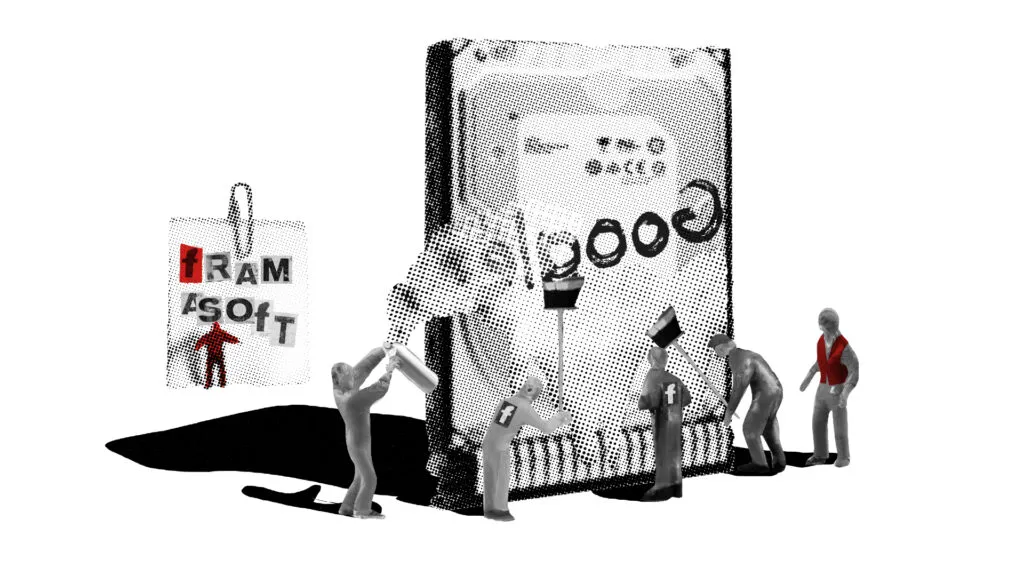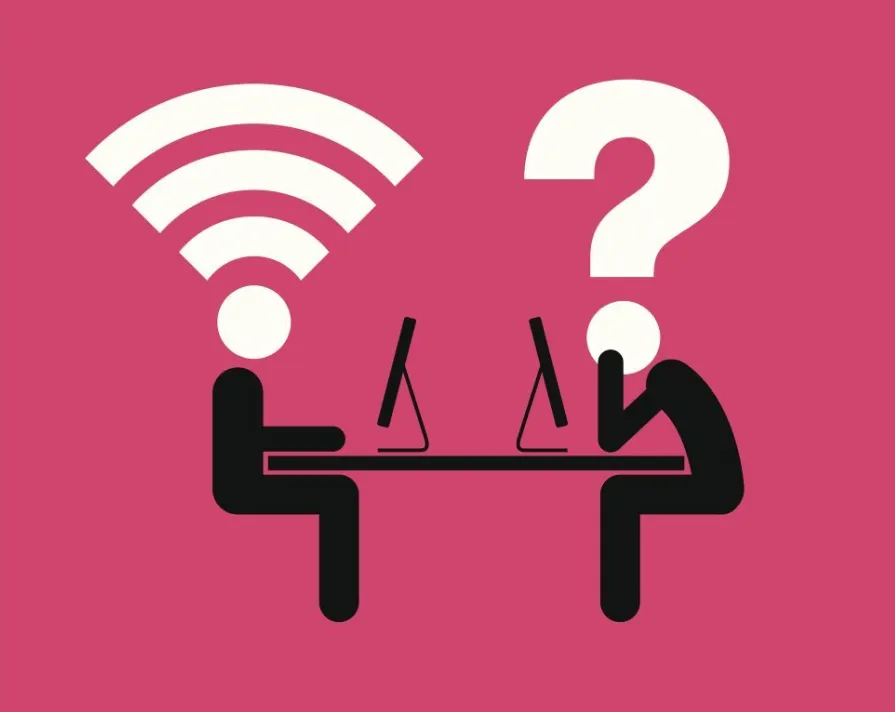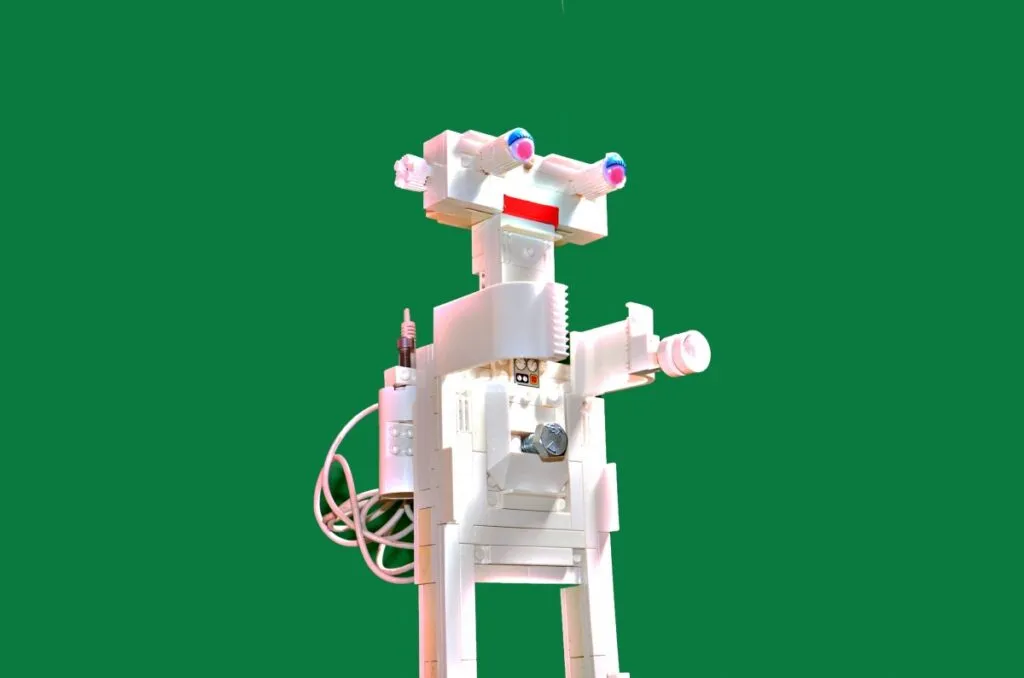Many thanks to our talented illustrator Julia Veldman C. for creating the image above.
In our Librecast project, funded by the European Cultural Foundation, we showcase a series of Pan-European case studies about sovereign media distribution, away from big tech. We highlight these examples and try to learn from them, as we urgently need more sovereignty in our media systems to ensure a well-functioning democratic media landscape. This time we spoke with Pouhiou Noénaute who works for Framasoft, a non-profit Association dedicated to Free Software based in France.
It all started with a French teacher and a Mathematics teacher at the beginning of this century, close to a decade after the invention of the World Wide Web. To bundle their education material online to be used and shared internally, the teachers launched an intranet website at their school. On it, the teachers also had a webpage where they shared a list of software tools that could be used free of cost. As the interest for the free software tools grew amongst students and staff, the webpage turned into a separate website and project on its own, eventually leading to the birth of a new non-profit association in 2004, called FraMaSoft.
Today, Framasoft has 38 members, including 10 permanent paid employees, and its services are used by approximately 1.4 million people each month. It is still dedicated to free software, but it has moved beyond understanding ‘free’ in monetary terms only.
“We realized that beyond sharing software for free lay a fundamental political project: to share knowledge, to share data and to share the power that you have when you develop software. It was this political vision for society that we wanted to commit ourselves to as an organisation”, Pouhiou Noenaute, co-director at Framasoft, explains.
Framasoft calls their work ‘popular education’. In contrast to vertical education, popular education is about education from peer to peer (p2p), where everyone is both a student and teacher and can contribute and learn from each other. Framasoft works with this concept through several practical projects. These projects can be hosted web services, guides and tools on changing digital habits, conferences and workshops around sovereignty within the digital sphere, public talks about the ‘toxicity’ of web centralisation and so on.
As Pouhiou puts it: “We try to raise awareness about the mechanisms of surveillance capitalism as the system behind tech giants like Microsoft, Amazon and Google. But we also focus a lot on how we could create alternative online spaces and reorganise our digital infrastructure, together, through countless experiments.”
From an online novel to a publishing house for free/libre books
Pouihou joined Framasoft in 2011 as a volunteer member doing PR and communications. In 2020, he became co-director. Pouihou was an author before he joined Framasoft, so he got to know the concept of free licenses and the work of Framasoft through the culture and arts scene. After choosing to publish his first novel not in print but online through a series of blog posts, Pouihou realised he didn’t want his copyright to prevent him from sharing his work and reaching a wide audience.
A couple months later, Pouihou’s novel was the first to be published by Framasoft through Framalibre, their publishing house for free/libre books.
“As soon as you create something, you have the copyright on something. So if you want to open your work, you can use this copyright that you have as a creator or inventor and ‘elevate it into the public domain’ – as we’d like to say at Framasoft”, Pouihou explains.
We are not talking about techno-solutionism here
Framasoft often works in alliances and networks with others. Of course, it collaborates a lot with developers and other digital experts. But Framasoft also actively works with groups and people who are not really tech-savvy, but whose values match with their own values, such as queer activists and ecological advocates. Fundamentally, Framasoft’s work on changing the digital world is connected to the work of many others who are working hard to radically transform the direction our economies and societies are taking. In fact, particularly within these activist circles, it can be very dangerous to use Big Tech tools.
In the words of Pouhiou, “just like the work of other activists, our work is about asking ourselves what kind of society we want to live in. Do we want a degenerative and divisive society where the winner takes it all? This is Big Tech’s dream, and we need to be aware of that”.
For many people, activists included, it is not always clear why we need to educate ourselves about the practices and values locked into our digital world. Some might even dismiss digital education for reasons of being too ‘technocratic’. Pouhiou explains, “we should be wary of techno-solutionism: the belief that we can find a solution for every problem through technology. This belief is often disputed by environmental activists in particular, and for good reason. But what Framasoft is doing is not about putting technology forward as the answer to everything. It is about harnessing the power of technology to serve the transition to a different society, with alternative values and practices, including in our online domain”.
When Framasoft had just begun, the team quickly noticed when they were giving presentations about free software and alternative digital techniques that it soon became too tech-savvy for people. This is why they launched their De-Google-ify-Internet campaign in 2014, to actively help people to install and use alternative digital tools and to be able to break away from a dependency on tech giants. There are currently 16 free software alternatives offered and installed by the team of Framasoft in France as a result of the De-Google-ify-Internet campaign, including alternatives to for example Google Forms, Google Maps, Google Docs, Zoom and Doodle. They are used by approximately 1.4 million people each month.
“It feels very empowering that as a small non-profit of only 10 paid employees, we can serve 1.4 million people each month. However, very importantly, our goal is not to become something like the “ethical Google”. This would be directly against what we are striving for. The point is to decentralise rather than centralise, to stop trusting one actor with all of our digital behaviour and instead share this responsibility and power amongst each other, as accountable digital agents”, Pouhiou explains.
The freedoms of free software
Framasoft endorses the four freedoms of free software [editors note: The exact definition of Free Software is here: https://en.wikipedia.org/wiki/The_Free_Software_Definition ] as coined by the founders of the concept in the 1980s. Today, these liberties remain as relevant as ever. Importantly, these liberties refer to the people who use the software, not to the software or the code itself. They include the following1:
- Freedom in usage, meaning you should be able to use the software however you want.
- Freedom to study, meaning you should be able to study how the code of the software is made if you want to.
- Freedom to modify, meaning you should be able to modify the code of the software and to adapt it to your own needs. Think of for example being able to change the colors of a computer game (when you’re color blind for instance).
- Freedom to copy, meaning you should be able to distribute the software however you want. This includes the original version but also a modified one.
In the view of Pouhiou, reasons to enclose software and knowledge are often rooted in a fear of success. He elaborates, “many designers and artists are wary of using free software for sharing their online creations because they are afraid of abuse and misuse. But sharing is critical for individual success! If others are doing the labour of sharing and distributing your own work, they are undoubtedly contributing to making your work a success. The beauty of Free Software is that you invite serendipity. You invite the possibility of the creation of things you couldn’t imagine yourself before.”
Pouhiou explains that there are still many things you can put in place for legal protection. Viral – or copyleft – licenses for example are an important one. Viral licenses allow others to use your software in a free manner (as defined by the four liberties in the above), but when they do so and for example modify the software, they need to share alike, and put the same license on it. In this way, the free software license becomes ‘viral’. You are essentially saying: “I am sharing my work, but if you use it, you must share it too”.
Peertube: A federated platform for peer-to-peer broadcasting
One of the concrete projects Framasoft is involved in is PeerTube. PeerTube is a free software program that forms an alternative to Youtube. It is installed on a server. Once it is installed, it creates a website just like Youtube. On this platform, you can share videos with other people, who can – if you allow them to – register, make playlists, create comments etc, while the videos remain on your server. In the words of Pouhiou: “because the platform is installed on your server, you make the laws, you are Google! You can for example decide that all of the videos put on the platform by others must be blue..”
In France, PeerTube is very popular. In fact, the French minister of Education is promoting teachers to make use of PeerTube in their education. There are two specific characteristics of PeerTube:
First, allowing individuals to create their own video platforms through their own server leads to many separate video catalogs that are all very small. That is why PeerTube enables every platform to be federated with each other. When someone chooses to federate their platform with someone else’s platform, both video catalogs will be shown on each other’s platform. Meanwhile, the videos will always remain on the server of the creator.
Second, when people watch videos, they will download bits of this video from the server on which the video is put. But the servers of individual people normally have a very small bandwidth. This means they easily become overloaded when many people watch videos that are put on these servers. There is a technical trick for this that is built within PeerTube. When several people watch one video at the same time, they not only download bits of the video from the server – they also share between one another bits of this video when broadcasting, in a peer-to-peer manner. Framasoft calls this peer-to-peer broadcasting.
Thanks to these two features of PeerTube, you don’t need one huge server like Youtube. You create a system with the same services Youtube offers, but designed around distributed ownership, sharing and cooperation. A system that is more autonomous, transparent and playful.
A federated universe of free and open-source software programs
PeerTube is part of another huge project Framasoft plays a role in, called the Fediverse. Fediverse stands for “federated universe”. Fediverse is made up of several free and open-source programs which can host content and creation and which can be installed on servers. The federatedness of the Fediverse concerns the communication protocols used by the software programs. These protocols function as language for the software. When an interaction is put into the code of these protocols, they can communicate with each other – they “speak the same language”. The most commonly used protocol in the Fediverse is called ActivityPub, the protocol also used by Mastodon.
There is a wide variety of software programs that span the Fediverse. Peertube is one of these software programs. Another software program that is part of the Fediverse is Mastodon, which has become more popular now that Elon Musk has taken over Twitter. Mastodon is made out of many servers, which can all interact with each other. All of these Mastodon platforms in turn, can communicate with Peertube.
As Pouhiou explains, the concept of “federatedness” in our digital interaction is not new at all – in fact, one of the most widely used online forms of communication happens in a federated way: E-mail. While we all use different platforms like Gmail, Runbox, Outlook or Proton mail, these platforms can all communicate with each other using the same protocols.
The importance of decentralising the internet
The work of Framasoft is rooted in a belief that if more people will install software programs on their own server, it will promote the decentralisation of the internet. At present, there are a handful of tech corporations who host most of the servers that many people use, tech giants like Netflix, Google and Microsoft.
As Pouhiou puts it: “these corporations are in essence the landlords of our online living spaces – with only a handful of them, they own all of the internet places used and inhabited by citizens. Since these online places are owned by tech giants, these corporations are seeing and following everything people do on the internet”.
In the words of Pouhiou: “Imagine a situation like this in real life instead of in the online world. Would you not prefer to have a real, actual person as a landlord? Someone you can talk to, who you can choose to trust or not, and who you can reach out to when something happens? There are no right or wrong answers to these questions, if people prefer corporations as their digital landlords, this is fine, but they should be made aware of the consequences and the repercussions of this decision. We should all be allowed to make this decision on an informed basis, just like with our real, physical living spaces”.
Today, we know that the surveillance techniques of Big Tech go further than tracking the content that people put online – they infiltrate our entire digital behavior. As Pouhiou puts it, “It’s not the information that you consciously share on the internet that Big Tech is most interested in – it’s the information about you yourself that can be extracted from your use of online spaces”. Information that can be (as it is happening today) sold to advertising companies or health insurance companies, to the government or even to political parties.
“In a world where digital technologies are everywhere, when you have the power to make the code, you have the power to decide what people can and can not do in the digital sphere. But as the digital world has invaded our lives, our culture and our civilisation, this power is more and more turning into a power that stretches beyond the online domain only. This power is not only held by those who can code but also by those who can buy the people who can code”, Pouhiou argues.
All of this leads to fundamental questions like: who do we trust with all this power and all of the information that can be extracted from us? What kind of society does this create? How can we share this power more equally, decentralise rather than centralise and have a more egalitarian society? Can we imagine an online environment where people would be emancipated, autonomous agents? Where digital tools can actually be empowering? Can we do this without all having to learn how to code?
When it comes down to Framasoft, the answer to these last questions is a wholehearted “yes”.



